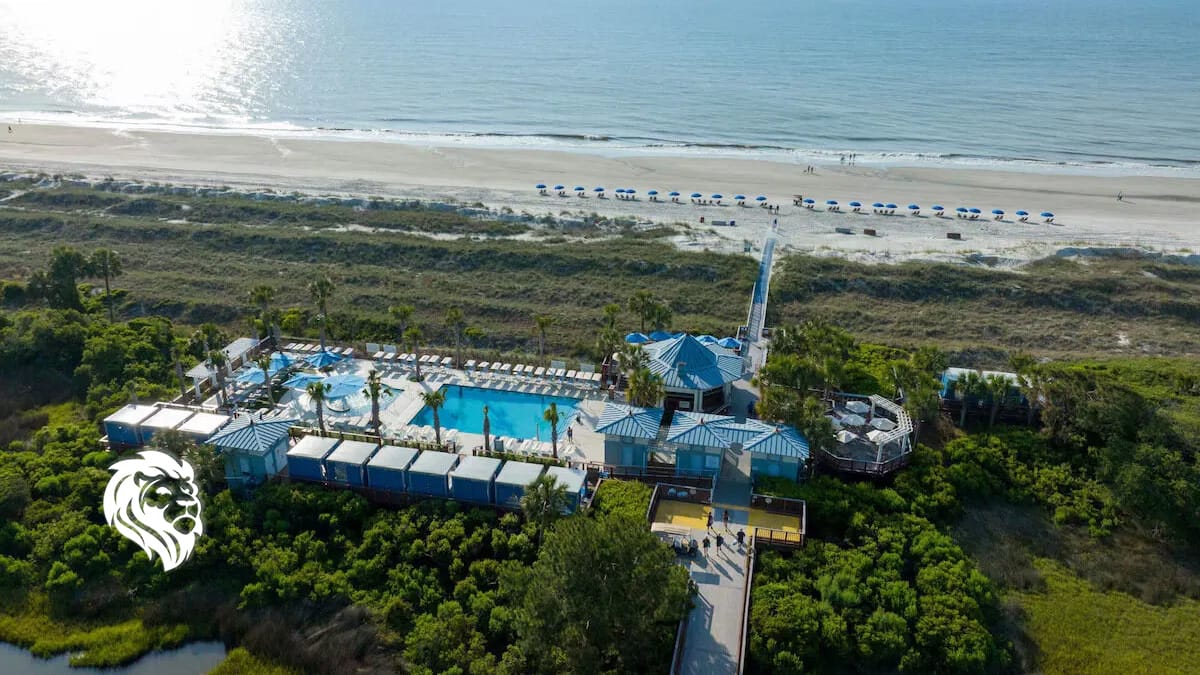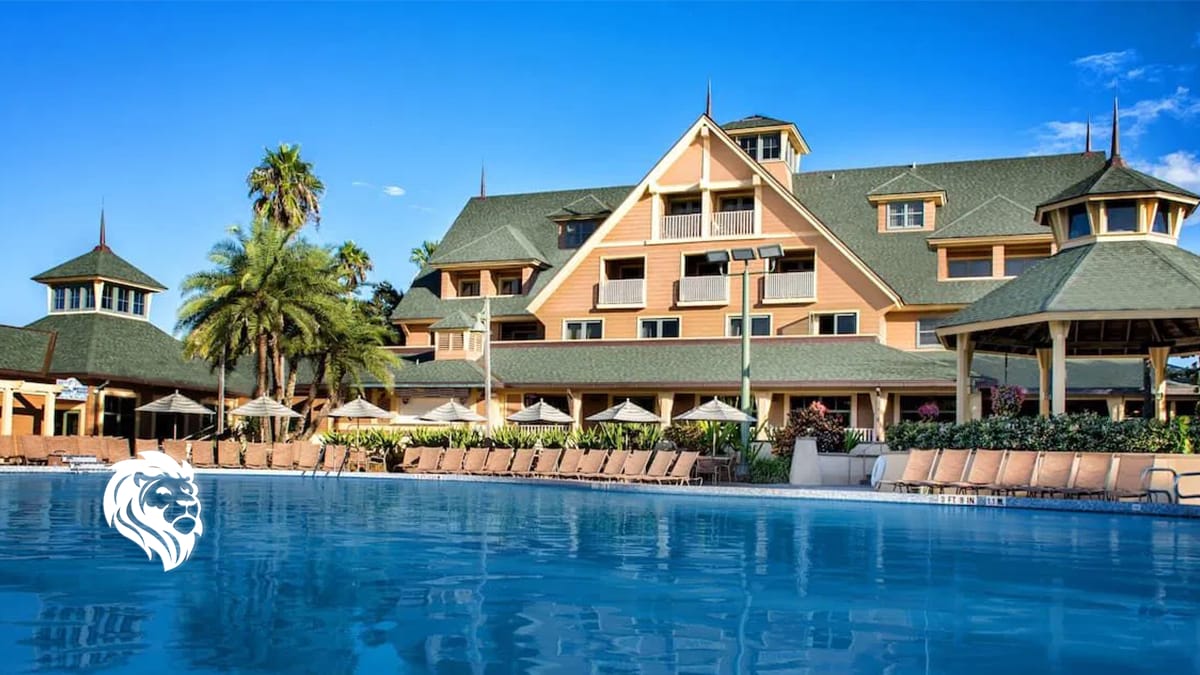Most people have heard of timeshares. Few people know precisely what they are or how they work. This confusion has contributed to timeshares’ bad reputation over the years. But while timeshares aren’t for everyone, they can be an excellent fit for some. In short, a traditional timeshare is a lifestyle product that lets you enjoy usage rights at a particular vacation property during a specific interval (usually one week) each year. Today, however, traditional weeks-based timeshares are being supplanted by points-based ownership, giving owners more flexibility in where, when, and how long they want to vacation. Still on the fence? Whether you want to create an annual vacation tradition at one resort, enjoy the freedom of points-based vacation ownership, or you’re just curious about the meaning of timeshare, read on as we answer the question, “What is a timeshare, and how does it work?”
- What is a Timeshare?
- How Does Timeshare Work?
- Types Of Timeshares & How Each Work
- Which Type of Ownership is for You?
- Which Timeshare Company or Developer to Pick?
- Timeshare Maintenance Fees: How Much?
- What is a Timeshare Resort?
- Top Brands
- Vacation Exchange
- Timeshare Buying Tips
- Why You Should Work With Fidelity Real Estate
- Buy a Timeshare With Fidelity Real Estate
- How to Sell a Timeshare and Avoid Timeshare Scams
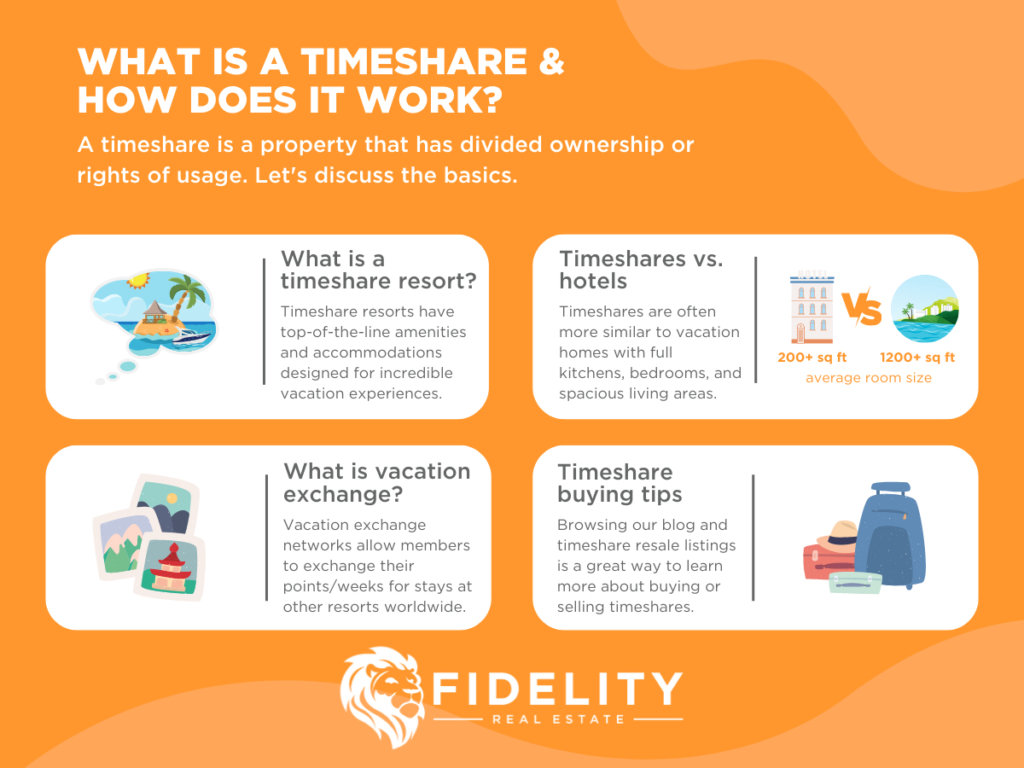
What is a Timeshare?
A timeshare is a vacation property (such as a villa or condo-style suite) that is divided for multiple owners by time. Most of the time, they are divided into 52 weeks so that every owner can have a full week at the property. The meaning of timeshare is as simple as it sounds! Timeshare owners share the property by time.
Nowadays, there are many different types of vacation ownership. As mentioned, most timeshare brands are moving to a points-based model of ownership as opposed to the traditional same-week/same-resort ownership. This allows owners to have the most flexibility in their vacation options.
How Does Timeshare Work?
Now that you know what a timeshare is, you might be asking yourself, “But how does timeshare work?” Through a timeshare arrangement, the costs of owning a property are spread out among several people, allowing them to enjoy the benefits of ownership without having to bear the entire cost alone. Vacation ownership is a unique way to share the costs of ownership with multiple people. Depending on the agreement, each party may own a fraction of the vacation property (known as “fractional ownership”) or simply lease it for a period of time.
What is the difference between timeshare and fractional ownership?
Fractional ownership comes with a registered title deed, like real estate. Some fractional ownership properties give you more time than a week for vacations, even up to months in some resorts. It’s similar to owning a vacation home, but with the benefit of sharing ownership.
While both timeshares and fractional ownership provide access to vacation properties, there are important distinctions between the two. With timeshares, ownership is often for a set week or a certain number of points each year, and while some timeshare deeds are considered real property, they typically shouldn’t be viewed as traditional real estate investments. Like a car, timeshares are a luxury purchase and generally lose value after the initial purchase.
Fractional ownership, on the other hand, typically means a larger share of the property and more usage time—sometimes several weeks or even months. Owners receive a deeded interest, and this type of ownership can feel more like co-owning a vacation home with others. However, both options come with ongoing costs, such as maintenance fees, which owners are responsible for as long as they hold their interest. It’s helpful to view both as ways to secure vacations in desirable locations, rather than as investments that will appreciate in value over time.
Types Of Timeshares & How Each Work

In order to understand how timeshares work, it is important to be aware of the different types! With multiple options, it can be overwhelming to figure out which is best for you. Watch the video to the left for an overview of each type.
Deeded Timeshare
A deeded timeshare property has the same ownership rights as actual real estate (however, unlike real estate, vacation ownership is not an investment and does not appreciate). Deeded ownership means the owner has the right to sell, bequeath, rent, or even give it away.
Right to Use Timeshare
Right-to-use (or RTU timeshare) ownership grants owners the right to use their ownership for a specified amount of time through a lease. Generally, the lease is for 30-99 years. Once the period of specified time is up, the ownership goes back to the resort, or the lease is terminated.
Leasehold Timeshare
Leasehold timeshares are similar to RTU. However, with a leasehold, you do have ownership without a deed for a set period of time. Disney Vacation Club is an excellent example of a leasehold timeshare company.
Different Timeshare Sub-Types


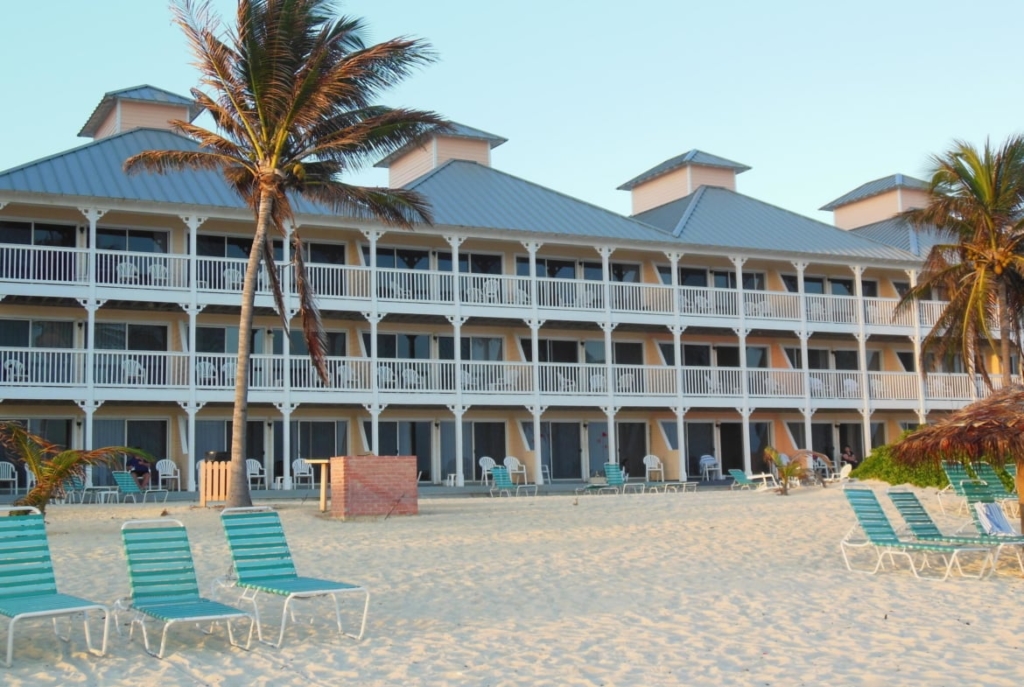
Fixed Week Timeshare
A timeshare week is the type of ownership that most people are familiar with. As with all timeshares, owners have paid for their share of time at the resort, and generally, that time equates to one full week. Each resort has a different calendar system for its owners. The first week of January is typically week one, however, and the last week of December is generally called week 52. With a fixed-week timeshare, you’ll stay at the same resort at the same time each year. This type of ownership is great for people who love a specific property or destination and want to keep coming back to it.
Points-Based Timeshare
Most companies these days use a point system for timeshare properties. How does a points-based timeshare work? Typically, the fixed week is converted into points. So, based on the week or caliber of ownership, vacation owners will have a certain number of points at their disposal. Guests can use these points to stay at different resorts in the brand’s network or stay at the unit at their home resort. When you check out timeshares for sale in our marketplace, there are point charts available for participating brands. You can see that the point value varies depending on the ownership type. Many timeshare owners love the control having a number of points gives you, letting you visit the beaches, mountains, and theme parks, all with the same ownership. Vacation Clubs are aware of this popularity, so your typical timeshare currently is most likely going to be points-based.
Floating Week
A floating week means that you can reserve your stay for any week of the year on a first-come, first-served basis. In some cases, floating weeks may only apply to a certain season. For example, an owner can own a week of the winter season, so they can stay at their resort any week available within that season. Depending on demand and location, some seasons have a higher value than others.
Biennial vs. Annual
A biennial timeshare just means that owners can use their ownership every other year. Annual is, well, annually! Meaning owners can use their ownership every year, given they pay their timeshare maintenance fees.
Which Type of Ownership is for You?
Thinking about which timeshare type is right for you often comes down to your travel habits and lifestyle. If you’re someone who values an annual vacation—maybe it’s the key to your work/life balance, or a cherished tradition for your family—owning a timeshare can offer a lifetime of memorable getaways. For those who return to the same destination year after year, or love the idea of having a “home away from home,” fixed-week timeshare ownership could make your travel dollars go further than booking hotels annually. On the other hand, if your travel style is more spontaneous and you crave variety, a points-based system gives you the flexibility to vacation when and where you want, whether it’s planning ahead or grabbing last-minute deals.
Which Timeshare Company or Developer to Pick?
Every brand is different, so make sure to check which form of ownership will work best for your travel lifestyle. The company you purchase from—often called the timeshare developer—will influence nearly every aspect of your ownership experience. This includes the types of contracts available, the weeks or points you can book, and the destinations you can access or exchange for.
Some developers still offer traditional fixed weeks, while others now primarily sell points-based memberships to new buyers. As major hospitality brands like Wyndham, Hilton, and Marriott have entered the scene, timeshare options have evolved to keep pace with changing traveler preferences. Resorts now compete with top hotels, offering upgraded amenities and services, and the destination portfolio has expanded far beyond classic beach locales.
Today, you’ll find timeshare resorts in places like Park City, Utah, for skiing, Yellowstone National Park for nature lovers, and bustling cities such as New York, Chicago, Portland, and Austin—giving owners even more flexibility and variety for their vacations.
Keep in mind, these premium experiences often come at a higher price. The industry average is close to $22,000. However, you can find timeshares on our resale market for a fraction of that price. As always, comparing what each brand and resort offers will help you find the best fit for your vacation goals and budget.
The Importance of Reading Your Timeshare Contract
If you decide to buy a timeshare, be sure to read your contract carefully. All timeshare buyers should check their contracts for info like what type and subtype of ownership they’re buying. Your timeshare agreement will also have other important info about your vacation property that may be important if you ever decide to sell your ownership.
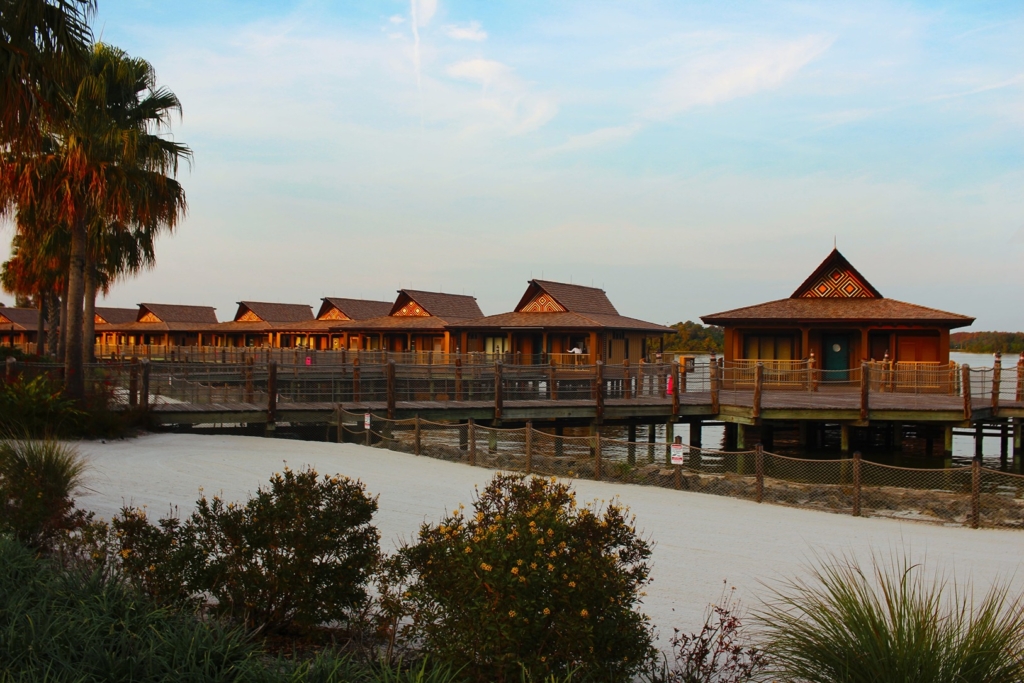
Click below to learn more about the different types of timeshares!
Timeshare Maintenance Fees: How Much?
According to the American Resort Development Association, maintenance fees averaged approximately $1,000. This can vary between brands, resorts, the number of points you have, or the specific week you own. Maintenance fees increase slightly each year, with a 2% increase between 2017 and 2019. Owners typically pay maintenance fees annually.
It’s essential to note that maintenance fees can vary significantly depending on the timeshare company, resort location, and the type of ownership you have. For example, major hospitality brands like Wyndham, Hilton, and Marriott have expanded into more premium destinations and urban hotspots—think Park City, Yellowstone, New York City, or even trendy places like Portland and Austin. These resorts often compete with luxury hotels, offering elevated amenities and services, which can impact the cost of annual fees.
As timeshares have evolved to include more upscale experiences and locations, purchase prices have risen, and this can also influence maintenance fees. Premium weeks or high-demand locations may incur higher annual costs, while the industry average tends to be around $1,000. Always review your contract and ask about how your choice of brand and destination might affect your yearly fees, as well as how they might increase over time.
Why Maintenance Fees Matter
Think of it as a way to keep your vacation spot in tip-top shape—without having to mow the lawn yourself or replace a leaky faucet. Thanks to these fees, you’ll arrive each year to a well-kept resort that feels just as fresh as your first visit. Pools get cleaned, landscaping stays lush, and amenities like spas, restaurants, and even ski lifts (at some resorts) are regularly updated and repaired.
What Do Maintenance Fees Cover?
- Housekeeping and cleaning services
- Upkeep of common areas like pools, gyms, and playgrounds
- Ongoing repairs and renovations to keep units looking modern
- Safety measures and landscaping
- Replacement of furniture, appliances, and linens
By pooling resources, owners get the perks of a vacation home—like spacious villas, separate bedrooms, kitchens, and even washers and dryers—without the big-ticket headaches of private ownership. In short, maintenance fees are your ticket to a hassle-free, resort-quality stay every year, with the added bonus of knowing the whole place will be ready and waiting for you.
What is a Timeshare Resort?



So, you know what a timeshare is and how it works. But what is a timeshare resort? Timeshare resorts are properties that feature top-of-the-line amenities and accommodations. Unlike hotels, vacation ownership resorts offer suites that include full-size kitchens, multiple bedrooms, and private balconies. Simply put, a timeshare resort is where vacation owners stay for their vacations. When you purchase a timeshare, you have the option to choose your home resort, which is where you will have priority booking every year.
Where Are Timeshares Typically Located?
Timeshares are usually found in some of the world’s most sought-after vacation spots. Think sun-soaked beaches in Hawaii or Aruba, theme park meccas like Orlando, and scenic hotspots such as California’s coast or the snowy peaks of Colorado. You’ll also spot timeshare resorts in bustling cities like New York, Las Vegas, and Nashville, offering urban adventures alongside relaxation.
Many timeshare resorts are centered around a specific activity—such as championship golf courses, ski-in/ski-out access, or relaxing on-site spas. Plus, it’s common for major players in hospitality—Marriott, Wyndham, Disney, and Hilton, just to name a few—to develop and manage these resorts. This means guests typically benefit from high standards, lots of amenities, and a consistent experience no matter where they travel.
Resort Amenities
When you decide to book a vacation, it’s important to consider the amenities you must have for a great vacation. Amenities are considered the extras at a resort, like fitness centers, swimming pools, day spas, water parks, and lazy rivers, just to name a few. Depending on the location, you can also find on-site ski slopes in places like Breckenridge, Colorado.
Residence Style Accommodations
The accommodations at vacation ownership resorts are undoubtedly one of the main things that set them apart from hotels. If you love traveling with a large group or extended family, timeshare resort accommodations are perfect. Many resorts offer suites that have anywhere from one to four locking bedrooms. This means everyone can have their own comfortable space to relax in.
Additionally, accommodations come with more than one bathroom, so you won’t all have to share just one. Not to mention, many villas or suites come standard with in-unit washers and dryers, as well as full-size kitchens and separate dining and living areas. The extra space leaves you more room to stretch out, watch a movie, and cook dinner, like the perfect home away from home.
Timeshares vs. Hotel
There are some key differences between timeshares vs. hotels. Timeshare suites are much like residences, with kitchens, bedrooms, and living rooms. Staying in a resort is more like staying in a vacation home or apartment than staying in a hotel. As you can see, the offerings at timeshare resorts are far more extensive than those at your average hotel. Did you know the average timeshare unit is 3x larger than a hotel room? Plus, you receive more than just a microwave. In addition, you can pack lighter and use the in-room laundry to freshen up your favorite vacation outfits. This is especially helpful for large families or families with children because you can pack less.
Want to learn more about the differences between timeshares and hotels? Then check out our blog!

Timeshares vs. Home-Sharing
Home-sharing is another form of lodging with many advantages over hotels. Home-sharing apps let you book homes from their owners. Like timeshares, these homes usually offer more space, privacy, and amenities than hotel rooms. However, home-sharing falls short of timeshare in a few key ways. Home-sharing accommodations don’t always live up to their pictures online. Timeshares, on the other hand, are meticulously maintained by the resort courtesy of maintenance fees. Moreover, home-sharing rentals often come with hidden fees, while timeshares feature all their fees upfront. And finally, while a home-sharing rental is just a home, a timeshare is usually part of a resort, which often has amenities like pools, fitness centers, and planned activities.
Should You Own a Timeshare?
Now that you know the difference, you might be wondering if timeshare ownership is right for you. If taking an annual vacation is important to you, or you love returning to a favorite destination with family and friends, owning a timeshare can offer a lifetime of memorable getaways—often making better long-term sense than booking individual vacations every year. It’s especially appealing for travelers who value consistency, spacious accommodations, and resort-style amenities.
So whether you’re exploring home-sharing or considering a timeshare purchase, it’s worth weighing the options to see which best fits your travel style and budget.
Top Brands
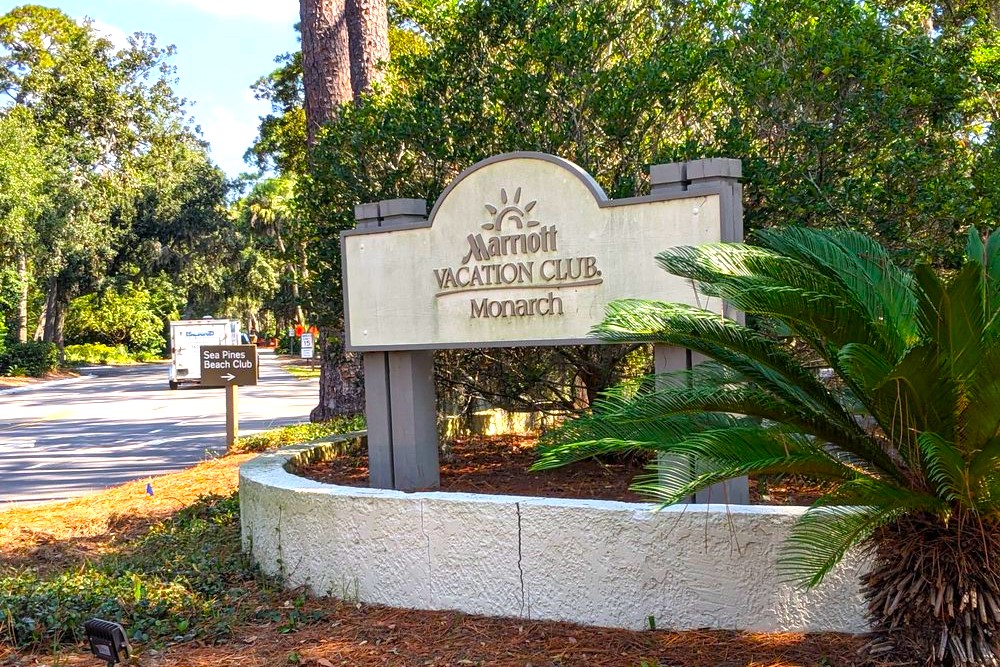

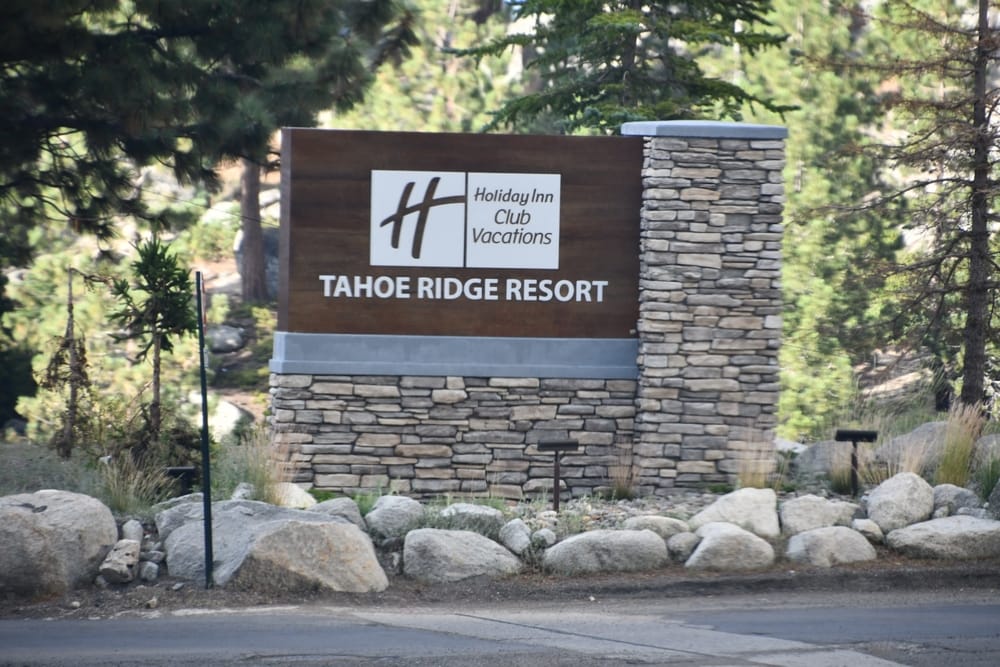
Make sure you research which company you want to own with before you buy a timeshare. Benefits and systems vary among the top brands.
Vacation Exchange
If you value traveling far and wide, you’ll be pleased to know that timeshares allow a lot of options when it comes to visiting new places. Vacation exchange networks allow members to go to different resorts with their points. Club Wyndham, Disney Vacation Club, and Marriott Vacation Club are all examples of internal exchange networks. You can travel within the brands’ networks to their other resorts. For example, if you own in Colorado, you may have the chance to exchange your week for a week in Hawaii.
RCI vs. II
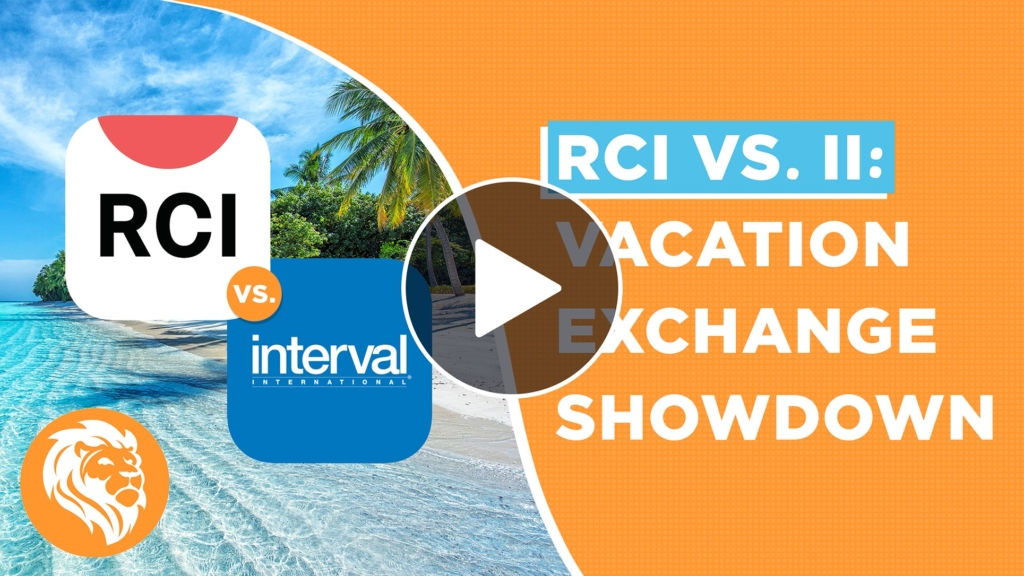
RCI (formerly Resort Condominiums International) and Interval International are the most recognizable vacation exchange networks. These networks are known as external, meaning with ownership AND membership (in one of these networks), you can travel outside of your brand as long as where you want to go is within the external network. Figure out which is the best in our vacation exchange showdown.
Timeshare Buying Tips

Now that you know how timeshares work, you might want to buy one, but should you buy a timeshare resale or direct from the resort developer? At the end of the day, it is a matter of preference, but we recommend considering the resale market first. Check out the video to the left to help determine which is best for you and your family!
How Much Does Timeshare Ownership Cost?
According to ARDA, the average cost of a timeshare in 2022 was $23,940. If you’re looking to buy a timeshare, the resale market has ownership at much lower costs than retail. The great thing about resale is that although from the secondary market, it is not second-rate. Brands work hard to keep their units looking luxurious, so you can purchase the same great ownership for less. Knowing the best buying tips is a great place to begin.
Our number one piece of advice is to do your research on choosing the best possible ownership for you. Do you want a fixed week in one location to guarantee your spot every year or points-based timeshare ownership so you can travel to new resorts? There truly is a timeshare perfect for everyone’s preferences. The major flexibility is just one of many reasons why people still buy timeshares.
Why You Should Work With Fidelity Real Estate

When it comes to navigating the timeshare industry, you’ll want to work with a trustworthy company. With Fidelity Real Estate, that’s precisely what you get. Fidelity Real Estate has been part of the timeshare industry for over 20 years and has an A+ rating with the Better Business Bureau. Plus, as a member of the American Resort Development Association, we follow a strict set of guidelines that help to keep everyone in the industry safe. As a result, you can trust us when you’re ready to buy a timeshare.
Buy a Timeshare With Fidelity Real Estate
Ready to become one of the millions of satisfied timeshare owners? Then check out our marketplace! We have listings from all of the best vacation clubs, like Hilton Grand Vacations Club, Disney Vacation Club, and Holiday Inn Club Vacations. Whether you want a floating week timeshare or one that’s points-based, we’ll help you take the vacation of your dreams at one of the top timeshare destinations. If you have any questions about annual maintenance fees, vacation exchange, or anything else about the industry, call us at 1-800-410-8326 or email [email protected]. Our licensed agents are happy to help!
How to Sell a Timeshare and Avoid Timeshare Scams
Selling a timeshare isn’t about making a profit on your ownership. It’s essential to enter the selling process aware that the resale value of your timeshare is often lower than what you originally paid. Unlike traditional real estate, timeshares generally do not appreciate in value (excluding some DVC ownerships).
There are also some important scams to watch out for along the way. The timeshare exit industry has its fair share of bad actors, so it’s crucial to steer clear of any company that demands hefty up-front fees, encourages you to stop paying your annual dues, or promises quick results that sound too good to be true. Working with reputable, licensed real estate agents—preferably those who are members of the American Resort Development Association (ARDA), like Fidelity Real Estate—is one of the best ways to ensure a safe and successful transaction.

If you’re looking to sell your timeshare, we can help with that all the way to close. Since we are real estate agents and timeshare experts, you can trust we’ll take care of you! If you’d like to know more about how to sell, be sure to check out our video. Or, to start the process today, fill out the form below.





